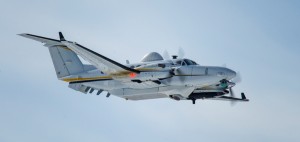Since the early days of the Iraq war, turbo prop aircraft have become a staple of intelligence, surveillance and reconnaissance (ISR) missions, carrying an array of sensors to feed an ever growing demand for near-real time intelligence.
High among that assortment of ISR aircraft has been the Beechcraft King Air 350. So when National Defence issued a Letter of Interest through Public Works and Government Services last August for “an enduring, operational level, multi-sensor manned airborne ISR capability,” Boeing was among many to respond.
The letter called for a capability “deployable on short notice to provide dedicated support to DND operations domestically or internationally,” but it also indicated that the department might seek to acquire the aircraft and the “prime mission equipment” outright. And, in fact, it went a step further and encouraged industry “to offer alternatives,” with supporting analysis, that would meet the project’s objectives.
Although it wasn’t indicated in the LOI, the requirement was for Canadian Special Operations Forces Command (CANSOFCOM), which is in the early stages of seeking a military commercial-off-the-shelf solution that would involve three to four aircraft that meet a defined set of criteria around airworthiness, mission performance, cockpit configuration and mission suite configuration.
In recent months, Boeing has been highlighting the capability of its Reconfigurable Airborne Multi-Intelligence System, better known as RAMIS, a Beechcraft King Air 350 extended range aircraft with a modular payload system that can be easily reconfigured to a wide range of intelligence missions.
Mike Ferguson, the company’s business development lead for Tactical Intelligence, Surveillance and Reconnaissance, confirmed during an interview at CANSEC in May that he had briefed CANSOFCOM and was hoping to demo RAMIS in the near future.
While special forces might be an obvious customer, search and rescue, maritime patrol and law enforcement are all targets of Boeing’s marketing campaign. What sets RAMIS apart from other King Air 350ER-based peers, especially in a SOF context, is an approach to multi-intelligence capability that is distinct from more traditional single-mission options.
Ferguson says there are five key components to an ISR platform and sensor suite: the type of target on which you are seeking to collect data; the technology (radio, etc) the target is using and the type of data you want to collect; the terrain in which the target is operating; the vegetation; and the size and scope of the search area. Once you understand those five mission requirements, you can then tailor your solution accordingly.
“Modularity allows us to optimize the sensors on the RAMIS aircraft based on those five parameters to make sure you have success when you are looking for that target,” he said.
The sensor payload, fitted into an extended nose and an underbelly fairing, includes high-definition imagery (IMINT), electronic (ELINT), signals (SIGINT) and communications intelligence (COMINT) capabilities.
The Boeing extended nose allows for a retractable electro-optic/infrared (EO/IR) sensor, a wide area airborne surveillance (WAAS) turret, and a ground moving target indicator/synthetic aperture radar (GMTI/SAR). Among other sensors, the underbelly can fit a gimballed EO/IR turret, wide area motion imaging (WAMI) and WAAS equipment, LIDAR systems, GMTI/SAR, as well as other COMINT, SIGINT and ELINT systems and data links.
The Windows software backbone uses standard networking protocols to integrated new sensors, and features onboard PED (Processing Exploitation Dissemination) to rapidly download data to ground forces or headquarters elements.
“We have the ability to tag, identify and locate signals of interest,” Ferguson explained. “If they talk, we are going to find them. We’re going to photograph and document their movements and associations, not only where they are, but who they are with.”
He also stressed the ability to overlay sensor data. “We’re able to watch the entire scene in multiple different views as well as in different spectrums to be able to tell what is happening…we can do coherent change detection between a visual spectrum and a radar – we can see what was there before the image was taken and what has changed.”
The long endurance aircraft – up to seven hours depending on the configuration – requires a crew of two pilots and can fit up to three sensor operators in two multi-screen console workstations.
A proven SOF asset in combat, RAMIS will likely be one of several options evaluated by CANSOFCOM. Boeing is hoping its commonality with the P-8 Poseidon maritime surveillance aircraft will make it an attractive fit for a country also considering an investment in the eventual replacement of its maritime patrol aircraft.

